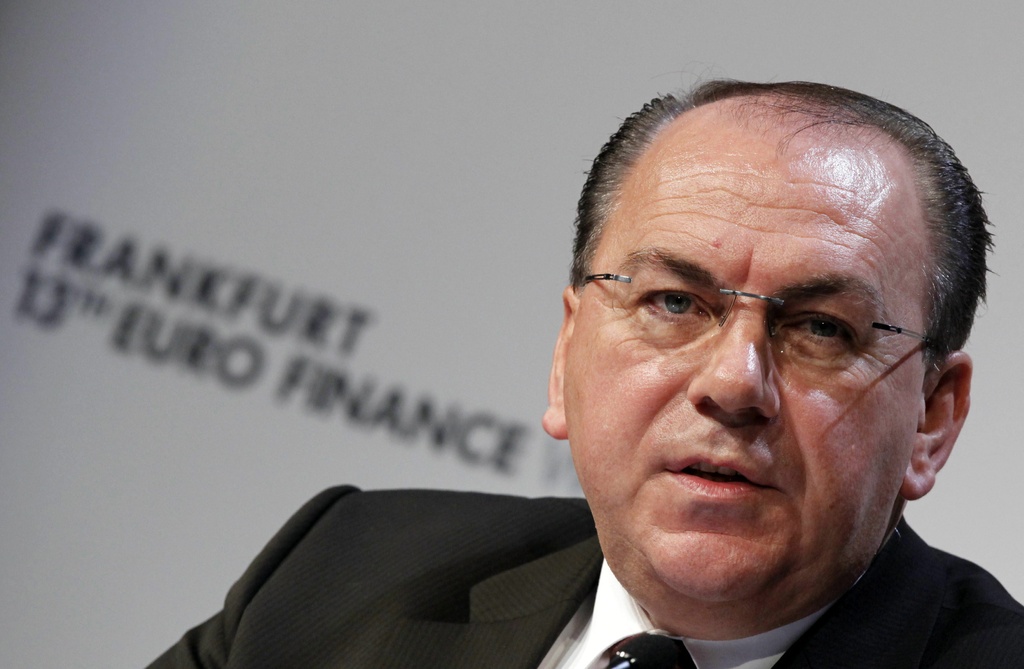UBS staff fear more heads will roll

Employees at UBS are facing another wave of potential job cuts as the bank announced plans to save up to SFr2 billion ($2.5 billion) in costs in the next three years.
With rumours circulating in the media that rival Credit Suisse will give details of a staffing cull on Thursday, the portents are once again looking particularly grim for workers in the Swiss financial sector.
UBS did not give details of how it would make savings of between SFr1.5 billion and SFr2 billion, announced as the bank reported its second quarter results on Tuesday. But insiders fear heads will roll as part of the cutback programme.
“We are dismayed to learn about possible job reductions at today’s press conference,” a “pessimistic” Dieter Biegger, head of the bank’s Employee Representative Committee (ERC), told swissinfo.ch.
“Current market conditions are obviously playing a part in the latest decision to cut costs further, but a feeling still persists that hard working staff are paying for the mistakes of senior management.”
Bonus bother
Biegger added that protestations from the ERC to senior management about rising salaries and bonuses to the top echelons at the bank had fallen on deaf ears.
While bonuses fell 11 per cent at the bank last year (to SFr4.25 billion or $5.95 billion), and more performance related pay has been deferred to meet long term targets, top bosses increased their share of the pot by a third.
The argument that top salaries are necessary to attract the best talent has been likened to football clubs driving themselves to economic ruin in a vicious circle of inflating players’ wages in the race to sign the biggest stars.
“The elite in banking circles have created this war for talent argument to protect their own bonuses,” Denise Chervet, Secretary-General of the Swiss Bank Employees Association told swissinfo.ch.
“This is an inefficient system because this so-called top talent is producing far greater losses than lower paid employees. Managers can’t expect personnel to make any more sacrifices until they take a serious look at their own salaries and bonuses.”
Targets revised
UBS’s recent performance has dipped alarmingly owing to rocky economic conditions in Europe and the United States and continued uncertainty over future regulations. Net profit in the second quarter plunged by half to SFr1 billion ($1.27 billion) compared with the same period last year.
“Banks’ returns have declined overall in the last 12 months, reflecting deleveraging and the actions being taken in advance of increased capital requirements,” stated chief executive Oswald Grübel.
“We are responding to this changed environment and the weakening economic outlook by adapting our business and increasing efficiency.”
The poor results have forced the bank into a humiliating u-turn on its medium term annual profit target of SFr15 billion – set at the end of 2009.
Grübel was unable to say how far short of expectations the original target – that was supposed to have been achieved by no later than the end of 2014 – would fall.
UBS is far from being the only global bank to have run into a wall in recent months. JP Morgan Chase and Deutsche Bank have both reported dismal figures, along with Goldman Sachs that will cut 1,000 jobs.
Analysts expect all the major international banks to come up short on their profits this quarter as the Greek debt crisis and the ongoing budget spat in the US drags down investor sentiment.
Jobs on the line
In June, UBS announced it would shed 500 staff (200 in Switzerland) as it outsourced IT operations to Bucharest.
Both UBS and Credit Suisse decreased headcount in Switzerland last year, but were responsible for the vast majority of the 7.9 per cent increase in staff that the Swiss financial sector employs abroad, according to Swiss National Bank data.
This trend has placed greater pressures on staff in the Swiss banks’ domestic markets, according to Dieter Biegger.
“Many Swiss-based personnel have been let go in recent years, processes have been optimised and cost saving measures have already been implemented to a large extent,” he told swissinfo.ch “Individual teams are today already stretched to their limits.”
In 2008, UBS employed 83,000 staff worldwide, but after the financial crisis the number was reduced to 64,300 this time last year. Like other banks around the world, UBS has been stocking up on numbers (now 65,400) in anticipation of a more favourable climate that has failed to materialise.
The Swiss media have also been busy speculating how many jobs will go at rival bank Credit Suisse, with reports aiming as high as 1,600 redundancies – 530 of them in Switzerland.
Credit Suisse would not comment on such rumours, two days before it releases its own second quarter figures.
UBS posted SFr1 billion profits in the second quarter, compared with SFr1.8 billion in the first three months of this year and SFr2 billion in Q2 2010.
Analysts had expected profits of between SFr1 billion and SFr1.5 billion.
Investment banking proved to be the biggest drag on numbers, with a 71 per cent year-on-year fall in profits to SFr376 million.
Group revenues fell 14% from the first quarter to SFr7.2 billion.
On a more positive note, the bank’s wealth management, wealth management Americas and asset management divisions saw combined net new money inflows of SFr9.3 billion.
But this was not enough to prevent the bank from scrapping its profit targets set at the end of 2009.
The bank is no longer expected to make SFr15 billion in profits by the end of 2014.

In compliance with the JTI standards
More: SWI swissinfo.ch certified by the Journalism Trust Initiative












You can find an overview of ongoing debates with our journalists here . Please join us!
If you want to start a conversation about a topic raised in this article or want to report factual errors, email us at english@swissinfo.ch.